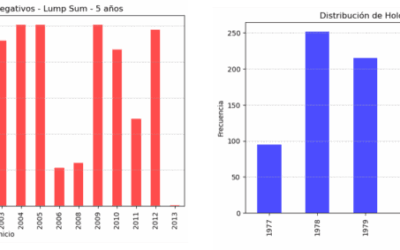The field of investments is a topic that is of increasing importance in our daily lives, yet it still carries certain prejudices due to lack of knowledge. What does it mean to invest my money? What risks does it entail? How much do I need to know before making a responsible decision? And what we will address today: Why is it important to invest?

1. Distinction between investment and savings
Savings and investment are two distinct strategies for managing our economic resources. While both involve a rejection of short-term spending and immediate consumption, they have some fundamental differences that are important to understand in order to decide which is more convenient.
Savings involve the accumulation of money with an almost negligible risk margin – there may be situations of crisis that have negative repercussions across the whole economy, but these are exceptions. Whether we keep the money in a bank or “under the mattress”, we set it aside as a short-term financial safety reserve that can be used for potential emergencies. Nevertheless, we are subject to limitations that investment surpasses.
Investment involves allocating our resources to assets with growth potential. Investing means making our money work for us, putting it into motion to generate gains. Unlike the “stagnation” implied by saving, investment not only allows us to preserve our purchasing power but also to grow our wealth. And although it is important to recognize the risks involved, it is a powerful tool for building wealth and meeting our financial goals. This happens thanks to the operation of certain concepts and mechanisms that we will explain below.
2. Protection against inflation – preservation of purchasing power
Inflation is a macroeconomic phenomenon that gradually reduces the value of money, leading to a constant increase in the cost of goods and services, directly impacting saved funds and all sectors of the economy in general.
Therefore, inflation constitutes a fundamental reason to consider investment as a distinct and more favorable financial approach than saving. Intelligent investment in assets that outperform the inflation rate becomes a key strategy for preserving -and even increasing- our purchasing power over time. Thus, establishing a reliable protective mechanism against the inevitable force of inflation in our favor.
3. Sustainable capital growth – compound interest
Compound interest is a fundamental concept in the realm of investments. Essentially, it is the interest that accumulates on the initial capital, generating new interests; it is the value added to the investment of a principle that reproduces itself, multiplying over time. This is distinct from simple interest, where the interest remains constant and does not increase due to the addition of earnings.
The true power of compound interest manifests itself over time. The longer we leave our money invested, the more it will grow. That’s why it’s important to have patience, resist the temptation to spend the acquired money, and reinvest it to allow the gains to continue generating increasingly higher returns.
At TBI, we emphasize the importance of adopting a long-term approach in our investment strategies, recognizing that time is a valuable ally in the pursuit of sustainable capital growth.
Let’s consider an example: Suppose an initial investment in the stock market of $1,000 and an annual return of 10%. At the end of the first year, $100 in returns will have been generated (1,000 x 0.10), resulting in a new balance of $1,100. In the second year, the $1,100 will be invested, and the returns will be 10% of that amount (= $110), resulting in a final balance of $1,210 for the second year. The 10% of this last figure (= $121) will be the return that constitutes a final balance of $1,331 for the third year. And so on; this is how compound interest acts, generating gains from the accumulation of interests. An analogy usually used is the snowball effect, which becomes exponentially bigger as the ball falls, same happens with the compound effect of investments.
Do you want to test how compound interest would work for you? Try our investment planning tool to discover the power of compound effect in your personal finance.

4. Generation of passive income – financial independence
Passive income is income obtained without direct effort, unlike income derived from salaried work. By strategically investing in financial assets, we can cultivate sources of income that flow steadily, regardless of our active participation in the labor market.
Passive income acts as a constant stream of resources, allowing us to explore new opportunities, pursue our passions, embark on new projects, or simply enjoy life without the complications associated with a restrictive work routine. This independence from traditional work becomes especially attractive when considering the long-term horizon, as it provides the possibility of self-sustainability and the ability to release from the need to work “for someone else”.
In essence, generating passive income through investments involves gaining financial assets, money, time, and autonomy, thereby enabling the development of a process that culminates in our financial independence.
5. Financial goals planning – confidence in the future
The importance of investing, in this context, is established as an essential element not only for economic growth but also for building a financial future grounded in our aspirations and values that inspire confidence and strengthen our vision of the future.
Planning in the realm of investments involves setting clear and achievable financial goals. This requires, in the first place, an exercise of introspection and a subsequent disposition of mind that encourages the discipline to adhere to the plan and the necessary temperance to make decisions in moments of tension.
Financial goal planning, then, will serve as a guide that instills confidence in the process and will conclude with the achievement of what initially inspired us to enter this exciting world of investments.
Conclusion
We have explored various concepts that underscore the importance of investing wisely and with a long-term vision. The clear distinction between investment and savings has emerged as the starting point, highlighting how intelligent investment goes beyond simple fund accumulation. We understood how protection against inflation translates into preserving purchasing power, acting as a shield against economic uncertainties.
Sustainable capital growth, driven by the power of compound interest, has been revealed as a fundamental tool for consistently building wealth. Passive income generation, on the other hand, stands as the catalyst for financial independence, freeing us from exclusive dependence on salaried work. Through financial goal planning, we have understood that charting a structured path toward our aspirations fosters complete confidence in the future.
Collectively, these elements illustrate the reasons why it is important to invest, going beyond the numbers and contemplating our personal goals and aspirations. Investment, then, becomes the solid foundation upon which we build a promising future. Ultimately, by adopting a balanced approach, we can look ahead with confidence, knowing that each investment decision is a step towards the realization of our dreams.
Don’t waste more time, start investing wisely today with our comprehensive guidance.




0 Comments